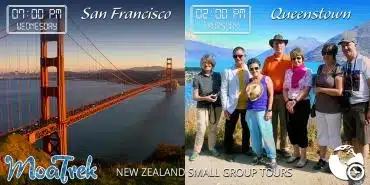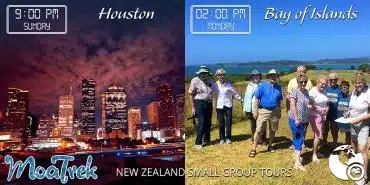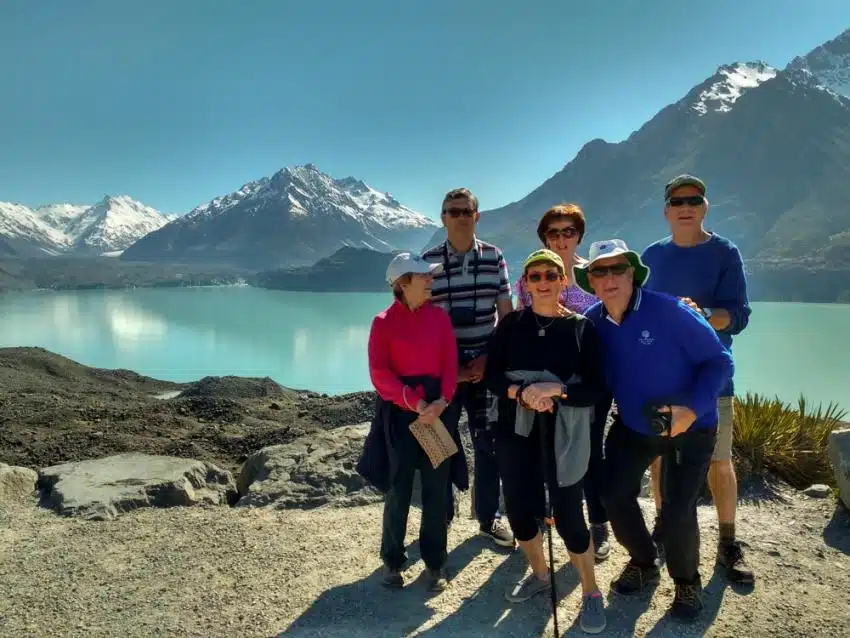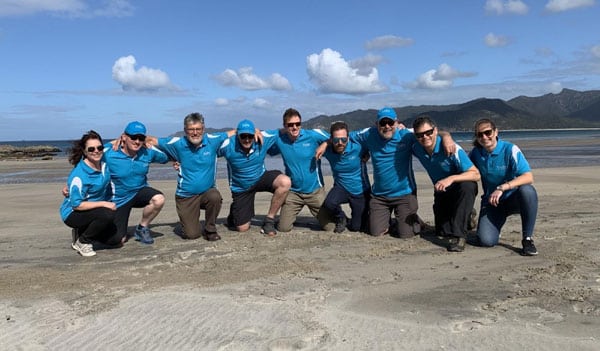Here’s a handy guide to travellers to help you work out the time differences between New Zealand and the USA.
Getting your head around the dateline and time differences can be tricky, so not worry, here’s a handy guide to time differences and the best time to call New Zealand from the USA (and calling home once you’re here) and a few more tips on how to handle that time difference.
Planning a trip to New Zealand from the USA and struggling to get your head around those time differences? What do you mean these crazy Kiwis are a day ahead but behind on the clock? How does that work?
We’re MoaTrek, and we’ve been hosting guests on our small group tours here in New Zealand since the 1970s, including heaps of people from all parts of the USA.
We’re totally used to working with the time difference and whether you’re calling up before you come over to visit, or need to figure out the best time to call family back home we’ll help you out, in friendly Kiwi style!
Time Zones in New Zealand and the USA
As New Zealand is one of the first countries in the world to receive the light of each new day and the US is one of the last, there is a significant time difference between the two countries.
The US also has several time zones, complicating the matter further. We’ve done the math so you don’t have to.
Office hours in New Zealand are similar to those of the United States. Most businesses receive calls between the hours of 9 am and 5 pm (09:00 and 17:00).
The entire country of New Zealand sits in a single time zone so every city works off the same schedule. Tourism businesses will often have expanded hours of phone support service.
We like a free online app called World Clock, which gives you the current time in any city in the world.
Before calling New Zealand it’s worth checking with this site to make sure you’re calling within office hours. Use Auckland as target city as every other city is in this time zone.
Here’s an example for US West Coast residents, have a look here to compare the time in Los Angeles (PT) and Auckland.
If we set the Auckland time to 9 am on Monday, just as the working week begins, we can see that the local time in California is 2 pm (PT) on Sunday. For most callers from the US, Sunday afternoon is a convenient time to call.
Remember: Sunday in the US is already Monday morning in New Zealand.

When to call New Zealand from the US (Central time, Pacific time, Eastern time)
For businesses that run on a 9 am to 5 pm schedule, the best times to call New Zealand are as follows:
- From Texas or Illinois: 4 pm to Midnight (CT), Sunday to Thursday
- From California and the state of Washington: 2 pm to 10 pm (PT), Sunday to Thursday
- From New York and Florida: 5 pm to 1 am (ET), Sunday to Thursday (1 am = Friday morning)
New Yorkers and people on the east coast of the US have a shorter time window for making calls. 9 am in Wellington is 5 pm in New York (the day before). If you plan to call a car hire company in Wellington at 9 am on Monday morning make the call at 5 pm (ET) on Sunday.
The typical office day in New Zealand ends at 1 am New York local time.
Say you’re in California and want to book talk to someone about an exciting Queenstown activity or a Maori Culture Experience in Rotorua the best time to call someone is from Sunday to Thursday between 2 pm and 10 pm. Enjoy an after dinner chat with a friendly Kiwi on the other end of the phone!
Say you’re in Texas and want to talk to someone in the Bay of Islands about dolphin swimming for example, you can call the Paihia visitor information center, which opens every day from 8.00 am to 7 pm in summer, from 3.00 pm to 2 am (CT) in the US.
The Bay of Islands is a favourite visitor spot and the visitor information centre has longer opening hours, especially during our summer. Smaller towns and destinations work on the typical 9-to-5 work schedule (4 pm to midnight in Texas).
Adjusting to local time in New Zealand
Jet lag is a concern for visitors to New Zealand as much as for any long-haul destination. Apart from visitors from the east coast of Australia, most travellers will have a long journey to reach New Zealand.
It’s a fact that flying east is often more exhausting than flying west. Read about some of the scientific reasons for this here.
US visitors have the advantage that most flights from the US to New Zealand fly west. As a result, travellers experience less intense jet lag than flying the same distance in the opposite direction. And you’ll need less time to recover once you reach New Zealand. This means you’ll be ready to experience the country with a good nights rest.

What’s the best time to call the US from New Zealand?
With so many interesting things to see in New Zealand, you’ll want to call family and friends back home to tell them all what you’re up to.
Whether you use a traditional phone, Skype or some other form of communication, keep in mind that people back home are in a different time zone. Chatting to friends is easier when they’re not waking from slumber at 4 am.
If your friends and family in the US work a traditional 9 to 5 schedule, these are the best times to call them for a chat. Let’s presume that 5pm to midnight (US time) is a reasonable timeframe.
- 5 pm to midnight in San Francisco, California or Seattle, Washington (PT) is 12 pm to 7 pm anywhere in New Zealand
- 5 pm to midnight in Colorado (MT) is 11 am to 6 pm in New Zealand
- 5 pm to midnight in Austin, Texas or Chicago, Illinois (CT) is 10 am to 5 pm down under
- 5 pm – 12 am in Miami, Florida or New York (ET) is 9 am to 4 pm local NZ time.
Weekends in the US start a day later than in New Zealand. Want to call your family on Saturday or Sunday back in Illinois or Colorado, make sure you call on Friday or Saturday, New Zealand local time.
When you join one of our trips, like our popular Kakapo 21 day New Zealand tour, we’ll provide you with a full itinerary before you leave home and you’ll be able to see which mornings you have some time for yourself. Use these times to call back home (this is especially true for the east coast of the United States) before your afternoon out exploring or travelling.
One of the best things about travel is the anticipation of discovering new things. It’s great to share your excitement with friends and family. Make everyone envious with your plans for the day before you even begin!
Adjusting to your home time zone after visiting New Zealand
Flying eastwards, as mentioned earlier, disturbs the body clock more than flying in the opposite direction. On returning home, visitors from the US often experience fatigue for a few days. This is natural and nothing to worry about. The most important thing is to set aside a day to recover and readjust. Heading straight back into a routine of work, intense physical activity, or more travel is not recommended.
What is the best way to adjust to your home time zone after your trip?
Try to get bright light or exposure to sunlight early in the day. Sleeping all day after a long flight will often prolong the jet lag. Ideally, you should grab a few hours rest and get the light of the day as early as possible. This will tell your body it’s daytime, that the day has started and its natural rhythms will then tell the body when it should expect to sleep.
Remember, get light early in the day and remove light sources at night. Don’t use an electronic device with a screen late in the evening as the light from these devices mimic daylight.
Why travel to New Zealand?
New Zealand is one of the most coveted destinations in the world at the moment, it seems like everyone wants to visit us!
This lightly populated oasis at the edge of the Pacific ocean has so much going for it that were it closer to the US or Europe, visitors would swarm to these shores in huge numbers. But getting here involves a little more planning than when visiting Cancun in Mexico, for example.
Visitors that make it to New Zealand are rewarded with the unique sights and experiences of the last major land mass on earth to be populated by the human race.
Travelling down under involves both a seasonal change and time zone adjustment. Most of all your body clock will need to adapt. But it’s worth it. Believe us! And we’re here to help you transition as easy as possible.
Read more New Zealand travel articles
When is the best time to visit New Zealand?





